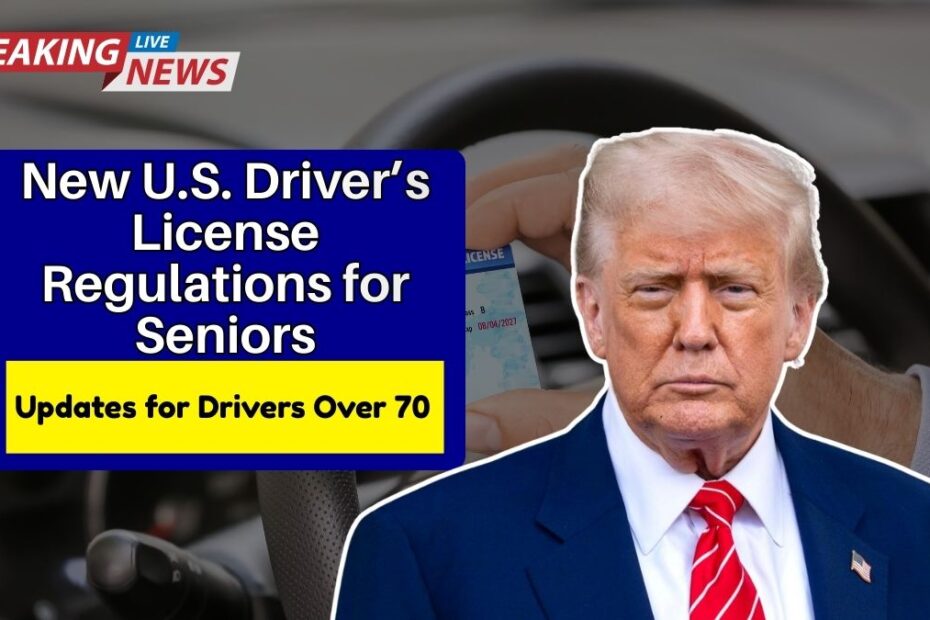As the population of older adults continues to rise, the United States has introduced new regulations specifically designed for drivers aged 70 and above.
These updated rules reflect ongoing efforts to strengthen road safety, particularly as more seniors remain active behind the wheel well into their late 70s and 80s.
For many older Americans, driving represents independence, mobility, and confidence, making these policy changes highly significant for families across the country.
Although states differ in how they apply these requirements, the intention remains consistent: to ensure that senior drivers stay safe without feeling restricted or isolated.
The revised rules aim to strike a balance between maintaining dignity and ensuring public safety on the road.
Why New Senior Driving Regulations Are Being Introduced
The new guidelines are being implemented by various state Departments of Motor Vehicles (DMVs), though details vary by region. The major updates include shorter renewal periods, mandatory vision screenings, and in many states, in-person renewals.
Authorities emphasize that the purpose is not to reduce independence but to identify early signs of declining vision, slower reaction times, or age-related health issues that may affect driving performance.
With a growing number of older drivers across the country, states are updating their systems to ensure long-term, sustainable road safety.
Shorter License Renewal Cycles for Seniors
One of the most significant changes under the new system is the requirement for more frequent driver’s license renewals after the age of 70. Instead of longer renewal periods, many states now require seniors to renew every two to four years.
Why Renewal Cycles Are Shorter
Shorter intervals allow DMVs to regularly evaluate:
- Vision clarity
- Cognitive health
- Motor skills and reaction time
This helps detect gradual age-related changes early, providing an opportunity for seniors to seek refresher driving courses or medical support.
For drivers aged 80 and above, some states have even stricter policies, requiring more frequent renewals or additional medical documentation. These measures are meant to offer structure and reassurance—not create unnecessary challenges—while keeping both seniors and other drivers safe.
Mandatory Vision Tests for Drivers Over 70
Declining eyesight is common with age, making vision testing a crucial part of the updated rules. Many states now require a vision exam at every renewal for seniors.
Types of Vision Checks
These may include:
- Eye-chart tests
- Depth perception evaluations
- Peripheral vision assessments
Seniors may submit results from an eye specialist, especially if they already use corrective lenses or receive treatment for eye conditions.
If a Senior Fails the Vision Test
Failing the exam does not automatically result in losing driving privileges. States often allow:
- Re-testing after treatment
- Licenses with restrictions (e.g., no nighttime driving)
- Requirements to use corrective eyewear
This flexible approach ensures that seniors who can drive safely with assistance remain independent.
In-Person Renewals and Additional Driving Evaluations
Another major shift is the move toward in-person license renewals. Many states now require drivers aged 70+ to appear at the DMV rather than renewing online.
Why In-Person Renewals Matter
This allows officials to:
- Observe alertness, coordination, and overall health
- Ensure proper identity verification
- Provide personalized assistance
Additional evaluations—such as written exams or behind-the-wheel tests—may be required in certain situations, especially when:
- Doctors report medical concerns
- Police observe unsafe driving
- Family members raise safety issues
These assessments are only used when necessary and are not part of the typical renewal process.
Medical Fitness Requirements for Senior Drivers
As health conditions become more common with age, several states now require seniors to provide medical clearance for conditions that might affect driving. These may include:
- Early dementia
- Stroke recovery
- Seizures
- Reduced motor control
- Medications that affect alertness
In these cases, a doctor may need to verify that the senior is medically fit to continue driving.
Families are encouraged to stay observant and supportive, as early medical intervention can help seniors remain safe drivers for many years.
The updated US driver’s license rules for seniors are designed to enhance road safety while preserving independence for older adults. By implementing more frequent renewals, vision testing, in-person evaluations, and medical fitness requirements, states aim to provide a thoughtful and balanced system that prioritizes safety without diminishing a senior’s sense of autonomy.
These changes not only protect senior drivers but also support families who want reassurance that their loved ones are safe on the road.
FAQs
Do seniors automatically lose their license if they fail a vision test?
No. States often allow restricted licenses, corrective eyewear requirements, or re-testing after treatment rather than immediate revocation.
Are behind-the-wheel tests required for all senior drivers?
No. These evaluations are only requested when a medical concern, police report, or family observation indicates a safety problem.
Do all states follow the same senior driving rules?
No. Rules vary by state, though many follow similar principles such as shorter renewal cycles and mandatory vision tests.
